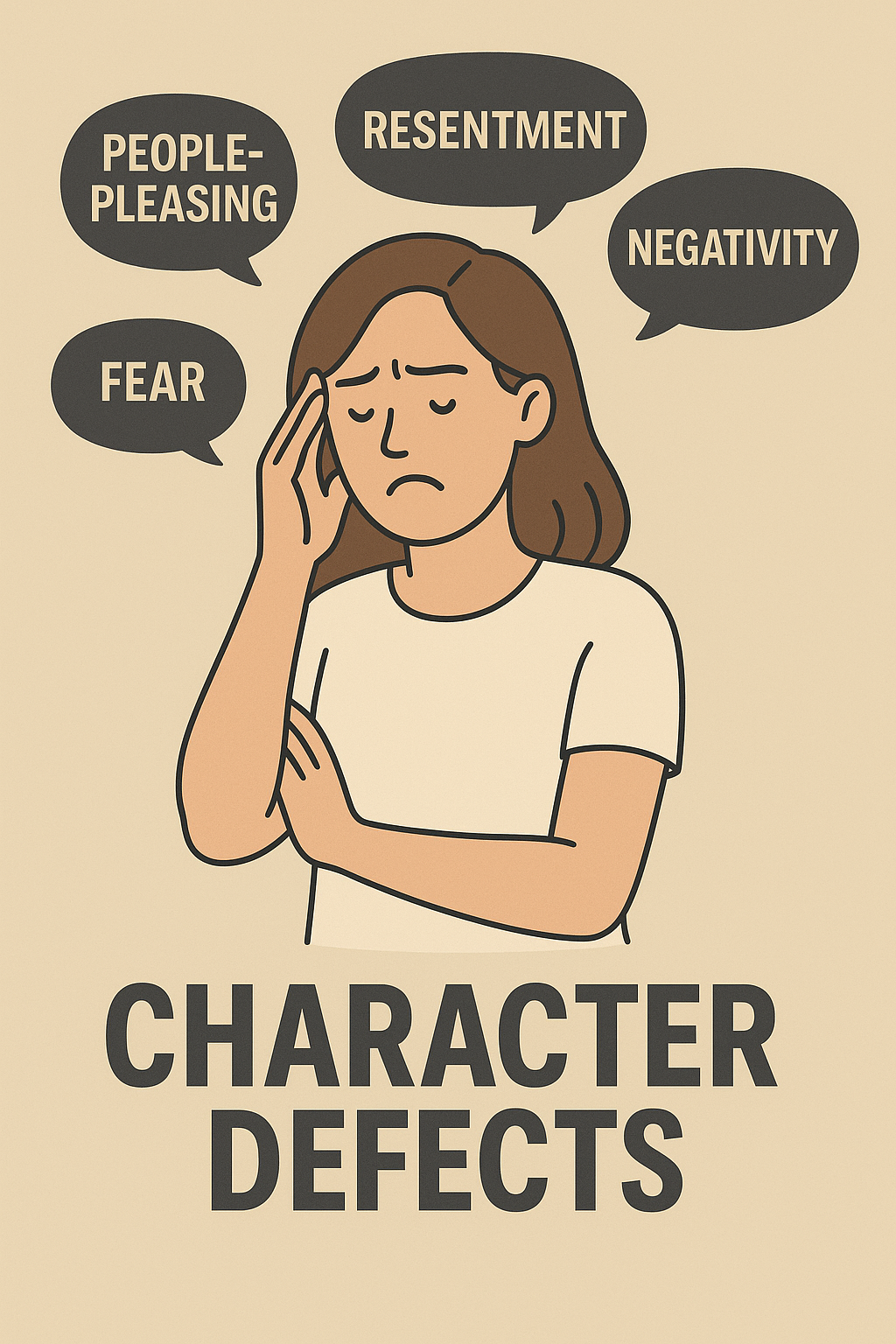
Your Character Defects Aren't Character Flaws
(I Promise This Matters)
Discover how to transform limiting patterns in just 30 minutes with science-backed techniques that actually work.
Okay so Monday morning I'm sitting in my car in the parking lot doing that thing where you give yourself a pep talk that you know won't work but you do it anyway because what else are you gonna do, right?
Today I'll speak up in the meeting. Today I'll say something smart. Today I won't just sit there nodding like an idiot.
Fast forward forty minutes and guess who contributed exactly zero words to the discussion while everyone else seemed to have fully-formed PowerPoints coming out of their mouths? This guy.
The worst part is I actually had something to say. Like, a genuinely good point about the budget thing they were discussing. But my brain did that thing where it's like "nah, everyone will think you're stupid" and then my throat just... closed? And then Janet from accounting made basically the same point I was thinking and everyone loved it and I wanted to disappear into my ergonomic office chair.
Maybe that's not your thing though. Maybe you're more like my cube neighbor who—I swear to god—has said yes to every single committee, project, and "quick favor" since 2019. She's currently planning three different office events while drowning in her actual job. Or maybe you're the person who's been "researching" that big project for six months because starting it means it might not be perfect.
I've been thinking about this stuff a lot lately because I stumbled into this Confidence & Calm Under Pressure thing at Mind Hack Lab and it kind of broke my brain in a good way. Turns out these aren't personality flaws or whatever. They're character defects—which sounds worse but hear me out—they're basically just old survival strategies that don't work anymore.
This Is Gonna Sound Weird But Stay With Me
So apparently (and I'm paraphrasing here because I'm not a therapist) your brain creates these patterns when you're young to keep you safe or loved or whatever. Like, being perfect meant your parents were proud. Saying yes to everything meant people liked you. Not speaking up meant you couldn't say the wrong thing.
Makes sense, right? Except now you're 32 (or 45 or 26 or whatever) and these patterns are literally ruining your life. The perfectionism that got you into a good college? Now you can't send an email without rewriting it sixteen times. I once spent twenty minutes deciding whether to use an exclamation point or a period. Twenty. Minutes.
But here's the part that really messed with my head: you can apparently start changing these patterns really fast. Like, stupid fast.
Ready to Transform Your Career Confidence?
Break free from limiting patterns with proven techniques that create real change.
No But Really, 30 Minutes?
I know, I know. Everything takes time. Change is a journey. You need years of therapy and meditation and probably some crystals or whatever.
Except... there's this whole body of research on single-session interventions that I'd never heard of. The learning report from LinkedIn talks about skills-based training creating immediate behavior change, and Mind Hack Lab has apparently helped a ton of people with these brief intervention things.
When I first read about it I was like "sure, Jan." Because nothing in my life has ever been fixed in 30 minutes except maybe a flat tire.
But then I tried it and... shit actually started changing? Not like, completely transformed overnight. But different. Noticeably different.
What These Patterns Look Like (You'll Probably Recognize Yourself)
So I started noticing these patterns everywhere once I knew what to look for:
- The Perfectionist (hi, me): Can't finish anything because it's not "ready." Spends longer editing than creating. Has seventeen drafts of texts that never get sent. That presentation that's 98% done but you keep tweaking the fonts? Yeah.
- The People-Pleaser: Their calendar is a crime scene. Hasn't said no since the Obama administration. Currently helping six people with their projects while their own work burns. Eats lunch at their desk IF they eat lunch.
- The Avoider: Inbox has 2,847 unread emails. That big project? They'll start it tomorrow. Or Monday. Or next month. Really good at finding urgent things that aren't actually urgent to do instead.
- The Catastrophizer: Already knows this won't work. Currently thinking about that embarrassing thing from middle school. Can turn any minor mistake into proof they're a terrible person.
One time my therapist asked me why I was so hard on myself and I literally said "because someone has to be" and she just looked at me for like ten seconds without blinking.
What Actually Helps (Specific Stuff, Not Just "Be Confident")
This is where it gets practical. Each pattern has specific techniques that interrupt it. And I mean specific, not "just believe in yourself" garbage.
For perfectionism, I learned this thing through Productivity & Achievement training. There's something called the 2-Minute Reframe that sounds dumb but works. You literally ask yourself "what would good enough look like?" and then you do that instead of the perfect version.
First time I tried it I was formatting a report. Normally I'd spend an hour making sure every margin was exactly right. Asked myself the question. Realized nobody cares about margins. Sent it with default formatting. Nobody died. Actually got complimented on getting it in early.
For people-pleasing there's this Boundary Script: Yes-With-Tradeoff from Confidence & Self-Worth Building. My coworker tried it when someone asked her to plan the holiday party (on top of the summer picnic and monthly birthdays she was already doing). She said "I can do that if I hand off the birthday planning to someone else."
Revolutionary? No. But she'd literally never done that before. Ever.
Why This Works (I Don't Fully Get It But It Does)
Something about how your brain forms new neural pathways when you practice different responses. There's science about the amygdala and prefrontal cortex that I won't pretend to understand.
What I do know is that after learning the Center-Breath + Label technique, I can sometimes catch my meeting anxiety before it takes over. Not always. Last week I still completely choked when the CEO asked my opinion. But yesterday I actually answered a question in a team meeting without my voice doing that weird shaky thing.
Progress? I guess?
The weird part is some of these techniques involve physical stuff. Like pressing certain points or moving your eyes back and forth. Sounds like nonsense but then you do it and suddenly you can think clearly again. Can't explain it.
Actually that's not true. They explained it. Something about bilateral stimulation and nervous system regulation. I just can't explain it because I was too busy being amazed that it worked to pay attention to why.
The Part Nobody Tells You
Here's what actually changes: you still have the patterns but now you have tools.
I still want everything to be perfect. But now when I notice I'm on draft number six of a Slack message, I can stop. Sometimes. Okay, like 40% of the time. But that's 40% more than before.
My people-pleasing coworker? Still says yes too much. But last week she said no to organizing a goodbye party for someone she'd never even met. Baby steps.
The truth is some days you nail it. You use the techniques, you catch the patterns, you feel like a functioning adult. Other days you're back to your old stuff. I spent three hours last Sunday organizing my email folders instead of doing actual work.
But even on the bad days, you know it's just a pattern. Not who you are.
That Thing About Identity
This is probably the biggest mental shift for me. These patterns felt like my personality. Like, I wasn't someone who HAD perfectionist tendencies. I WAS a perfectionist. Full stop. End of story.
But they're not who you are. They're just strategies you learned.
- You're not "a perfectionist." You're someone who learned that being perfect kept you safe
- You're not "weak" or "pushover." You're someone who learned that saying yes avoided conflict
- You're not "lazy." You're someone who learned that not trying meant not failing
God that sounds so therapy-speak when I write it out. But it's true? Like, once you see these as learned patterns instead of fixed traits, you can actually change them.
So What Now?
Look, I'm not here to sell you anything. I mean, Mind Hack Lab is a thing and it works, but mostly I'm just tired of seeing people (including me) struggle with the same patterns forever because we think that's just how we are.
Pick whatever pattern is currently making your life harder than it needs to be:
Can't sleep because your brain won't stop?
Avoiding human interaction?
Can't focus on anything for more than twelve seconds?
Just try one thing. The Worry Window technique or the Middle-of-the-Night Protocol or whatever speaks to your particular flavor of dysfunction.
Worst case scenario? You waste 30 minutes. Best case? You start changing patterns you thought were permanent.
I mean, you've probably wasted 30 minutes on worse things. I once watched a 45-minute video about how hot dogs are made.








